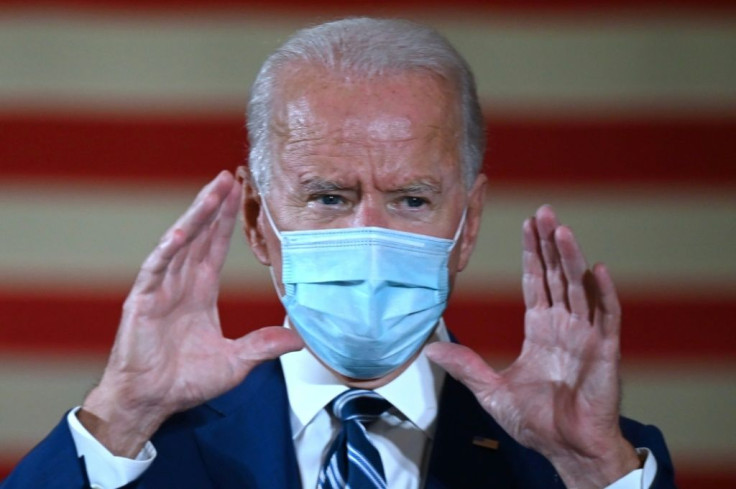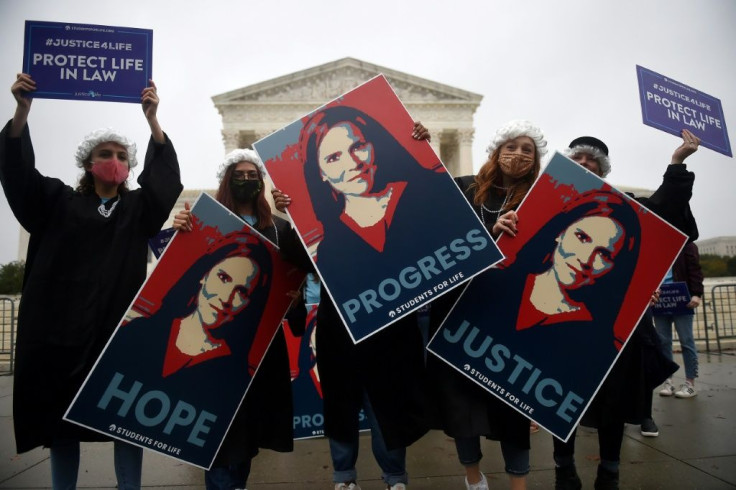Biden Noncommittal But Some Democrats Favor Expanding Supreme Court
Joe Biden says he is "not a fan" but won't rule it out if he wins the US presidential election -- expanding the number of justices on the Supreme Court to counter those named by Donald Trump.
Under the Constitution, justices on the nation's highest court are nominated to lifetime posts by the president and confirmed by the Senate.
Congress sets their number, and after some seesawing in the country's early days it has remained steady at nine since 1869.
Barring a surprise, the Republican-controlled Senate will in the coming days approve Trump's nomination of Judge Amy Coney Barrett to replace Ruth Bader Ginsburg, the liberal icon who died on September 18.
That would bring the number of conservative justices on the bench to six, including three nominated by Trump, potentially cementing a conservative majority for decades to come.
Senate Democrats have decried "rushing" through a nomination just weeks away from a presidential election, but there is little they can do about it.
However the possibility of a Democratic victory on November 3 has given rise to the question of expanding the court, so-called "court-packing."
"We should leave all options on the table, including the number of justices that are on the Supreme Court," said Representative Alexandria Ocasio-Cortez, a rising star in the progressive wing of the Democratic Party.

The suggestion of adding justices to the venerable body has raised Republican hackles.
Senator Mike Lee, a Republican from Utah, said it would "delegitimize the court."
"Before long it looks like the Senate in Star Wars, where you've got hundreds of people on there," Lee said.
Most Americans appear to oppose expanding the court.
In a YouGov poll, 46 percent said they opposed increasing the number of Supreme Court justices while just 21 percent said they supported it.
"Americans have this vision of the Supreme Court as apolitical," said Kevin McMahon, a professor of political science at Trinity College. "That's not true but Americans have that vision.
"And when you have the political body getting involved in the court, it raises concerns that the judges will just be politicians in robes," McMahon told AFP.

A previous US president, Franklin Roosevelt, tried but failed to expand the court in 1937.
Frustrated that the court had struck down elements of his "New Deal" legislation, Roosevelt sought to "pack" it with favorable justices.
The move, however, was seen as a power grab and became unnecessary after two justices switched their positions on the New Deal reforms.
Roosevelt's experience helped dissuade his successors from any further attempts to tamper with the makeup of the court.
But it resurfaced in March 2016 when the Republican-majority Senate refused to consider the nomination of a justice named by Democratic President Barack Obama, arguing that it was too close to the November 2016 presidential election.
"There's a lot of people in the Democratic Party who feel that the Republicans essentially stole a seat from the Democrats," McMahon said.
Senate Democrats have accused their Republican colleagues of hypocrisy by pushing ahead with Barrett's nomination even closer to a presidential election.
Biden has been asked repeatedly on the campaign trail about "court-packing" but has tended to dance around the subject.
"I'm not a fan of court-packing, but I don't want to get off on that whole issue," he told CNN affiliate WKRC. "I want to keep focused.
"The president would love nothing better than to fight about whether or not I would, in fact, pack the court or not pack the court," he said.
Biden's vice presidential nominee Kamala Harris also proved evasive about "court-packing" when confronted about it at her debate with Vice President Mike Pence.
"The American people deserve a straight answer," Pence said.
McMahon said Biden's approach to the question of expanding the court may be strategic.
"He may want that as a potential tool in his toolbox," he said. "He doesn't want to say he is against it because he's concerned with what a very conservative court might do."
"It's more about saying to those on the left of the party that he's going to play hardball, just like Republicans who play hardball," he said.
Daniel Hemel, a professor at the law school of the University of Chicago, said Biden was wise not to rule it out.
"Court-packing is a nuclear option -- helpful to have and dreadful to invoke," Hemel wrote in a column for The Washington Post.
© Copyright AFP 2024. All rights reserved.




















